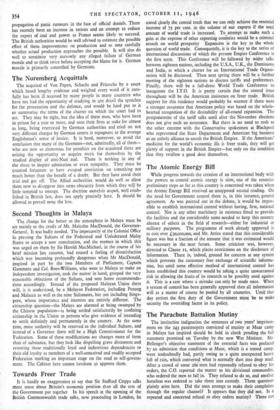Towards Freer Trade
It is hardly an exaggeration t6 say that Sir Stafford Cripps talks rtiore sense about Britain's economic position than all the rest of the Government put together. In his speech at the opening of the British Commonwealth trade talks, now proceeding in London, he stated clearly the central truth that we can only achieve the essential increase of 75 per cent. in the volume of our exports if the total amount of world trade is increased. To attempt to make such a gain at the expense of other exporting countries would be a criminal assault on world prosperity Expansion is the key to the whole question of world trade. Consequently, it is the key to the series of international discussions of which the present Empire Conference is the first term. This Conference will be followed by wider talks between eighteen nations, including the U.S.A., U.K., the Dominions and India, at which a charter for an International Trade Organi- sation will be discussed. Then next spring there will be a further meeting of the eighteen nations to discuss tariffs and preferences. Finally, there will be a full-dress World Trade Conference to inaugurate the I.T.O. It is pretty certain that the central issue throughout will be the American insistence on freer trade. British support for this tendency would probably be warmer if there were a stronger assurance that American policy was based on the whole- hearted recognition of the desirability of all-round expansion. The postponement of the tariff talks until after the November elections does not give such an assurance. But there is no need to rush to the other extreme with the Conservative spokesmen at Blackpool who represented the State Department and American big business as an unholy alliance to smash the British Empire. If the Americans' medicine for the world's economic ills is freer trade, they will get plenty of support in the British Empire—but only on the condition that they swallow a good dose themselves.






























 Previous page
Previous page